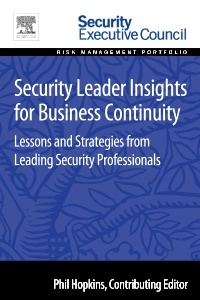Description
Security Leader Insights for Business Continuity
Lessons and Strategies from Leading Security Professionals
Coordinator: Hopkins Phil
Language: English
Subject for Security Leader Insights for Business Continuity:
64 p. · 15x22.8 cm · Paperback
Description
/li>Contents
/li>Biography
/li>Comment
/li>
How do you, as a busy security executive or manager, stay current with evolving issues, familiarize yourself with the successful practices of your peers, and transfer this information to build a knowledgeable, skilled workforce the times now demand? With Security Leader Insights for Business Continuity, a collection of timeless leadership best practices featuring insights from some of the nation?s most successful security practitioners, you can. This book can be used as a quick and effective resource to bring your security staff up to speed on security?s role in business continuity. Instead of re-inventing the wheel when faced with a new challenge, these proven practices and principles will allow you to execute with confidence knowing that your peers have done so with success. It includes chapters on the business resiliency and emergency preparedness, leading during a crisis, corporate social responsibility, and the Voluntary Private Sector Preparedness Certification Program. Security Leader Insights for Business Continuity isa part of Elsevier?s Security Executive Council Risk Management Portfolio, a collection of real-world solutions and "how-to" guidelines that equip executives, practitioners, and educators with proven information for successful security and risk management programs.
Introduction
1. When the Unpredictable Occurs
Three experienced security professionals discuss how to deal with the unanticipated consequences of "Black Swan" events.
2. Building a Resilient Business
Increase your company’s ability to bounce back from interruptions with these tips for developing a business resiliency program.
3. Leading in Crisis
A global security leader shares his experiences and strategies during the events of the Egyptian Revolution of 2011.
4. When Emotions Run High: Dealing with Stress in Crisis Management
An experienced security professional shares insight into managing emotions during the response to a crisis event.
5. Improving Crisis Management through Social Responsibility
Learn how a corporation can behave in a socially responsible way to help minimize reputational risk and improve local and global continuity.
6. Business Leading Government
Strategies for corporate security professionals on taking the lead when developing public-private partnerships.
7. Business Continuity and the Data Center
Whether you outsource, maintain your data center in-house, or use the cloud, ensure your data center is adequately protected with these tips for business continuity.
8. Planning for Pandemics
One experienced security practitioner shares business planning and response guidelines for when a pandemic affects the workforce.
9. Preventing Brand Damage from Web-Based Incidents
Four experts share tips for protecting your company’s brand before, during, and after a web-based incident.
10. Exploring the Voluntary Private Sector Preparedness Certification Program
Three experts discuss the benefits of business continuity certification under the Voluntary Private Sector Preparedness Certification Program and how to prepare for certification.
11. Emergency Preparedness: Compliance, Care, and the Long View
Improve your business’ preparedness and resiliency with these strategies for all-hazards risk mitigation.
12. Resilience Requires Intelligent Preparedness
An experienced security practitioner shows how current crisis response and business continuity practices have been shaped by past catastrophic events.
Mr. Hopkins joined Western Union in July 2006 as vice president in the Corporate Security department with responsibility for agent due diligence, crisis management, employee background checks, executive protection and travel safety. In January 2011 Mr. Hopkins took over responsibility for the entire global security team.
Previously, Mr. Hopkins served as the director of corporate security for the First Data Corporation where he was responsible for executive protection and event security.
Prior to his private sector experience, Mr. Hopkins served 20 years in the United States Secret Service where he completed his career as the assistant special agent in charge of the Houston Field Office. During his career he fulfilled assignments in the Charlotte Field Office, Miami Field Office, Bush Protection Division, Washington D.C. Headquarters and the Houston Field Office.
Mr. Hopkins received a Bachelor of Science Degree in Criminal Justice from Auburn University and in 2011 he completed the Wharton School ASIS Program for Security Executives. Mr. Hopkins currently serves on the Advisory Council for the International Association of Financial Crimes Investigators (IAFCI) and he is a member of ASIS International, the International Security Management Association (ISMA), the Overseas Security Advisory Council (OSAC), and the Domestic Security Advisory Council (DSAC).
- Each chapter can be read in five minutes or less, and is written by or contains insights from experienced security leaders.
- Can be used to find illustrations and examples you can use to deal with a relevant issue.
- Brings together the diverse experiences of proven security leaders in one easy-to-read resource.




